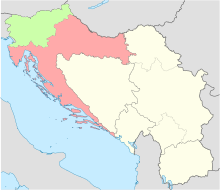Brioni Agreement
The Brioni Declaration was an agreement signed on July 7, 1991 , which was supposed to open a peaceful way out of the crisis caused by the break-up of the Yugoslav state . Slovenia and Croatia undertook to suspend their state independence, which they unilaterally declared on June 25, 1991, for a period of three months. In the time gained in this way, the leaderships of both countries should negotiate with the Yugoslav authorities about a peaceful solution to the conflict. This was preceded by fighting between the Slovenian territorial defense and units of the Yugoslav People's Army , which were later referred to as the 10-day war .
The agreement is named after the Croatian island of Brioni , where the conflicting parties met for negotiations through the mediation of the EC .
The delegation of the Yugoslav federal government was led by Prime Minister Ante Marković . Interior Minister Petar Gračanin and Foreign Minister Budimir Lončar accompanied him ; Vice-Admiral Stane Brovet was present as the representative of the Defense Minister and the Yugoslav People's Army. Slovenia was represented by the Chairman of the State Presidency Milan Kučan , Prime Minister Lojze Peterle , Foreign Minister Dimitrij Rupel , Parliament President France Bučar and the last member of Slovenia in the Yugoslav Federal Presidium Janez Drnovšek . Croatia was represented by President Franjo Tuđman . The EC delegation consisted of three Foreign Ministers: Hans van den Broek (Netherlands), Jacques Poos (Luxembourg) and João de Deus Pinheiro (Portugal).
The agreement stipulated the cessation of fighting in Slovenia and the withdrawal of the Yugoslav People's Army from Slovenian territory. In return, Slovenia and Croatia suspended the execution of their declarations of independence until October 7, 1991. By then, a peaceful solution to the secession sought by Croatia and Slovenia should be negotiated.
The Brioni Agreement was a success for Slovenia. It led to the cessation of the armed conflict and the withdrawal of the Yugoslav troops. After the three-month period there were no new attacks and the road to independence was clear. In Croatia, however, the conflict with the Serb minority intensified during this period; Negotiations with the Yugoslav federal organs did not lead to a compromise, they were not prepared to accept Croatia's independence within the old borders, and after the deadline, units of the Yugoslav army intervened on the side of the Serbian irregulars in the civil war .
literature
- Daniel Eisermann: The long way to Dayton. Western politics and the war in the former Yugoslavia 1991 to 1995 . Baden-Baden 2000, ISBN 3-7890-6756-3 .
Web links
- Uppsala University. Department of Peace and Conflict Research: The Brioni Declaration. ( Memento from October 30, 2008 in the Internet Archive )
